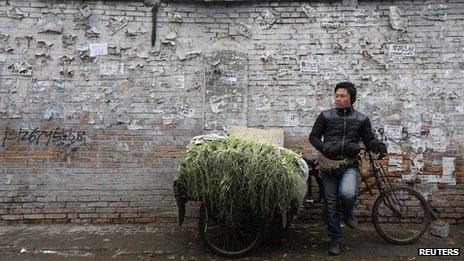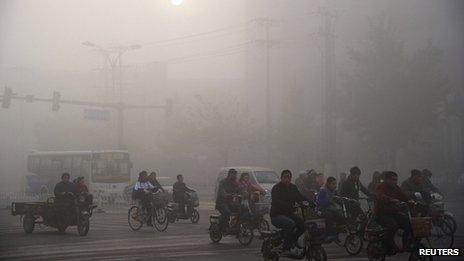Why China's Third Plenum matters
- Published
The decisions of the Third Plenum meeting have a huge potential impact worldwide.
At a busy open-air market in the centre of Beijing, shoppers are focused on finding the freshest, cheapest vegetables on offer.
Slices of pumpkin sold for 40 cents a pound were too expensive for one elderly woman. After berating the pumpkin stall owner, who barely shrugged in response, she shuffled off in search of a less expensive option.
Though it is likely to be held only few kilometres west, the upcoming big meeting of the Communist Party's top bosses, or the third session of the 18th Communist Party Central Committee, seems light years away.
The Third Plenum is simply the third time that Xi Jinping will meet with his top brass in his role as the party chairman. It is a closed door meeting attended by the ruling party's bigwigs. But it is important because the grand plans that come out of this meeting could affect everyone in China - and beyond.
President Xi Jinping is expected to unveil a new economic framework for the country after the summit. Hopes are high he will swoop in to remedy some the country's biggest headaches, from pollution to soaring property prices.

A growing wealth gap is one issue China's leaders need to tackle
But at the market, those asked about the big meeting nodded their heads to acknowledge they had heard of it, but their hopes for reform were focused on their daily lives.
"I want issues like housing prices to be discussed," explained one retiree as she bargained for a pound of cucumbers. "I hope that issue can be resolved for the families in need."
'Low efficiency'
In the past, the Third Plenum has done more than that; past leaders have seized on their third meeting with other party officials as a chance to announce dramatic changes to the Chinese economy.
Former Communist leader Deng Xiaoping was the first one to use a major party meeting in 1978 to announce China would open itself up to global trade.
Fifteen years later, Zhu Rongji, the country's vice-premier who then ascended to the role of prime minister, endorsed another round of restructuring combining private enterprise with strong support for state enterprises. That mixture spurred China to become the world's second-largest economy.
China's leaders want a more modern economy, shifting further from a centrally planned system, though experts all have differing opinions about where the government should start.
For some, the problems with China's cumbersome state-owned banks pose a huge bottleneck in economic growth.
"State-owned banks are more interested in lending to state-owned enterprises because this is politically safer. Leaders of state-owned banks are more interested in political promotions rather than profitability of the bank," explained Zhu Guozhong, professor at Peking University's Guanghua School of Management.
"So this leads to a very low efficiency in the allocation of funds. More funds go to less efficient state-owned enterprises and we have very active, very creative private firms. They need finance but they don't get it. I think this is a very urgent problem in China."
Others believe that government monopolies in sectors like oil and telecommunications are the real issue.
"State-owned companies, especially industrial state-owned companies, are generally in debt. This is unfair because they take up a lot of state resources, such as land and loans," explained Sheng Hong, director of the Unirule Institute of Economics, a private think tank based in Beijing.
"They haven't made profits in about two decades, but those officials receive unlimited salaries and bonuses. Chinese people hand resources to this group of people but they don't reward the people at all."
'No silver bullet'
Xi Jinping will have to negotiate between competing interests if he hopes to engineer ambitious reforms to the country's state-owned assets. Any new plans will be the product of months of closed door meetings between officials who represent competing interests.

More balanced development is needed to tackle severe pollution, observers say
A comprehensive plan will need to take many moving parts of the economy into account.
"It would be wrong to say there is one silver bullet that will solve all the problems," explained Axel Van Trotsenburg, World Bank Vice-President for East Asia and the Pacific. "All issues need to be put together, co-ordinated and a consensus towards implementation."
Even if Mr Xi shows willingness to steer China away from its centrally-planned past towards a more dynamic future, be sure to take his initial plans with a pinch of salt.
It is no secret in China that it is much easier for reforms to be announced, but that is just the start of a long process. It is very difficult for those reforms to be carried out, particularly if they threaten local interests.
Still, Xi Jinping is under pressure from many parts of Chinese society to unveil radical changes. If he doesn't, the big meeting might be an equally big disappointment.
- Published8 November 2013
- Published8 November 2013
- Published4 November 2013
- Published26 October 2013